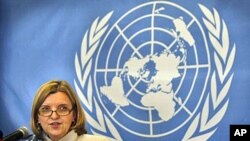In Nepal, it is unclear who will supervise thousands of former Maoist fighters as a United Nations peace mission in the South Asian country prepares to wrap up its mission, later this week. Nepal’s peace process remains deadlocked, four years after a civil war ended and brought the Maoists into the political mainstream.
One of the main mandates of the United Nations peacekeeping mission in Nepal has been to monitor about 20,000 former Maoist fighters who were confined to camps after the rebels ended their insurgency and entered a peace process in 2006. Their weapons were locked in metal containers.
Four years on, as the U.N. mission prepares to leave, wrangling political parties have been unable to decide on the future of the fighters.
The Maoists want them drafted into the army, but several political parties oppose it.
The Maoists have warned the peace process could collapse if U.N. monitors leave. They say they do not want their former fighters and weapons to be overseen by a government-run committee. But their request for an extension of the peace mission was turned down by the interim government.
Monday, officials of the U.N. mission urged the government and the Maoists to agree on a new monitoring mechanism for the fighters and their weapons.
The editor of Nepali Times newspaper, Kunda Dixit, is optimistic that some solution will be worked out in the coming days.
"There won’t be any major upheaval. I personally think the Maoists themselves will probably come up with some sort of a compromise," Dixit said.
The United Nations mission was given several extensions. But U.N. officials have said that it makes little sense to keep it open without any progress on key political issues.
The peace process stalled nearly two year ago, because of differences that surfaced between the Maoists and their political rivals about the integration of the fighters into the army and other issues.
Since then, political infighting between major parties has intensified, amid a power struggle for control of the next government. The country has been without a government for six months, as 16 attempts to choose a new prime minister have failed. Parliament will again tackle the issue Wednesday. However, this round also is not expected to produce a winner.
UN Peacekeeping Mission Prepares to Wrap Up in Nepal










